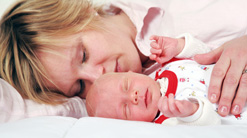The Natural Child Column
Parenting and educating that respects children
Ten Reasons To Sleep Next To Your Child at Night
by Jan Hunt
 1. Family co-sleeping takes full advantage of the ease of breastfeeding, as there is no need to go to another room to get the child. Thus co-sleeping encourages mothers to extend breastfeeding and all of its numerous benefits for a longer time. 1. Family co-sleeping takes full advantage of the ease of breastfeeding, as there is no need to go to another room to get the child. Thus co-sleeping encourages mothers to extend breastfeeding and all of its numerous benefits for a longer time.
2. Gaps in breathing are normal during early months of infancy, and if not prevented or attended to can lead to Sudden Infant Death Syndrome (SIDS). Recent research suggests that shared sleep can help prevent this heart-breaking event, in two ways. First, recent research has shown that the mother's breathing provides important cues to her infant, reminding him to take a breath following exhalation, preventing a SIDS situation from developing. Second, even if this reminder system fails, the mother is nearby to help by arousing her infant. A breastfeeding mother and baby tend to have co-ordinated sleeping and dreaming cycles, making her keenly sensitive to her baby. If she is sleeping close by, she will automatically awaken if there is a long breathing gap. But if the baby is alone this life-saving intervention cannot take place.
3. Suffocation is often listed as a danger of family co-sleeping. However, this is a real danger in only two situations: a young infant sleeping on a water-bed, thus unable to push himself up when needed, or a parent who is too drugged or drunk to attend to a child's needs. Obviously, a child who is suffocating for any reason (such as a ribbon on sleepwear getting around her neck, vomiting during sleep, asthmatic attacks) is far more likely to rouse a parent who is sleeping nearby than one sleeping in a different room.
4. Any night-time danger to a child is reduced if there is an adult close by. Babies and children have perished in fires, have been sexually abused by visiting relatives, have been abducted from their beds, have been attacked by pets, have suffocated after vomiting, and have died or been injured in various ways that could have been prevented had a parent been nearby to help.
5. Family co-sleeping is often misunderstood as facilitating sexual abuse of children by a parent. However, the opposite is true. Parents who develop deep emotional bonds with their children by remaining close by and responsive at night, as well as during the day, are far less likely to turn to abusive behavior of any kind toward the children they love and cherish.
6. Shared sleep can further prevent child abuse by helping all family members to obtain the rest they need, especially if the child is breastfeeding. The child does not have to cry to bring its mother, and the mother can nurse half-asleep. The entire family awakes refreshed, with no lingering resentment toward the baby for having disturbed their sleep the night before. An exhausted parent is far more likely to abuse a child than a well-rested mother or father who has enjoyed the presence of a happily resting child through the night.
7. Crying is a signal provided by nature that is meant to disturb the parents so that the baby's needs will be met. But prolonged crying is stressful to all family members. The sooner the baby's needs are met, the more rest the baby and the entire family can have, and the more energy they will have for the next day. A mother sleeping next to her baby can utilize the instinctive response a new mother has to her baby's first whimper, thus preventing the need for the hard crying that is so stressful to the baby and to all the family members.
8. A deeper sense of love and trust often develops between siblings who sleep near each other, lessening sibling rivalry during waking hours. Such siblings have a greater opportunity to build a deep and lasting relationship. Babies and children who are separated from other family members during the day (parents at work, siblings at school) can partially make up for these absences and reestablish important emotional bonds by spending time together at night, and by the delightful early morning family time together that is otherwise often missed. Of course, home businesses and deschooling can minimize separations and deepen family bonds during the day, just as co-sleeping does at night.
9. Studies of adults in coma have shown that the presence of another person in the room significantly improves heart rate, heart rhythm and blood pressure. It seems reasonable to assume that infants and children derive health benefits by having others in the same room with them.
10. A child who is cared for during the night as well as during the day receives constant reassurance of love and support, instead of having to cope with feelings of fear, anger and abandonment night after night. Children who have felt safe through the night as well as the day with loving parents close by become adults who cope better with the inevitable stresses life brings. As John Holt put it so eloquently, having feelings of love and safety in early life, far from “spoiling” a child, is like “money in the bank”: a fund of trust, self-esteem and inner security which the child can draw on throughout life's challenges.
This article was published in Natural Life Magazine in 1996.
|

